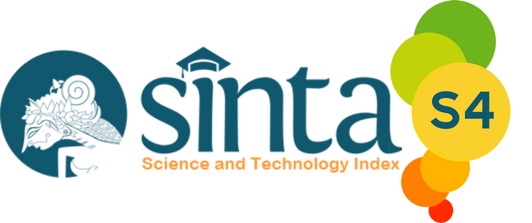Dampak Program Pemberdayaan Petani Melalui Sekolah Lapangan di Desa Bonorejo Kecamatan Gayam Kabupaten Bojonegoro
Abstract
Keywords
Full Text:
PDFReferences
Dadi, D. (2021). Pembangunan pertanian dan sistem pertanian organik: Bagaimana proses serta strategi demi ketahanan pangan berkelanjutan di Indonesia. Jurnal Education and Development, 9(3), 566–572. Tersedia dari https://journal.ipts.ac.id/index.php/ED/article/view/3031
Dwidjowijoto, R. N., & Wrihatnolo, R. R. (2007). Manajemen pemberdayaan sebuah pengantar dan panduan untuk pemberdayaan masyarakat. Jakarta: Elex Media Komputindo.
Handini, S., Sukesi, & Astuti, H. K. (2019). Pemberdayaan masyarakat desa dalam pengembangan UMKM di wilayah pesisir. Surabaya: Scopindo Media Pustaka Press. Tersedia dari https://books.google.co.id/books?hl=id&lr=&id=Lf7EDwAAQBAJ&oi=fnd&pg=PA11&dq=Pemberdayaan+Masyarakat+Desa+dalam+Pengembangan+UMKM+di+Wilayah+Pesisir&ots=8tljql0z5o&sig=I3LbiYYbhsZHLknPKgIYSYlT0ds&redir_esc=y#v=onepage&q=Pemberdayaan%20Masyarakat%20Desa%20dalam%20Pengembangan%20UMKM%20di%20Wilayah%20Pesisir&f=false
Ilham, M., Kusmiah, N., Manggabarani, I., & Amsari, A. N. (2022). Perbandingan nilai ekonomi, usaha tani padi organik dan anorganik di Desa Galeso Kecamatan Wonomulyo Kabupaten Polewali Mandar. Jurnal Agroterpadu, 1(2), 138–142. https://doi.org/10.35329/ja.v1i1.3450
Karimi, E., & Niknami, M. (2020). Analyzing impacts of farmer field school on the economic, social, production, and knowledge status of greenhouse owners: Evidence from Tehran Province and its surrounding counties. Journal of Agricultural Science and Technology, 22(1), 27–41. Tersedia dari http://jast.modares.ac.ir/article-23-18938-en.html
Mildaerizanti, Edi, S., & Adri. (2022). Sekolah lapang kedaulatan pangan jagung upaya tingkatkan kemampuan teknis dan kemandirian petani. Prosiding Seminar Nasional Pengabdian Kepada Masyarakat, 3(1), 279–290. Tersedia dari https://journal.unj.ac.id/unj/index.php/snppm/article/view/33837
Mosher, A. T. (1997). Menggerakkan dan membangun pertanian. Jakarta: Yasa Guna.
Nadirah, I. (2020). Pelaksanaan corporate social responsibility (CSR) terhadap masyarakat sekitar wilayah perusahaan perkebunan. Iuris Studia: Jurnal Kajian Hukum, 1(1), 7–13. https://doi.org/10.55357/is.v1i1.15
Parmila, I. P., Suardike, P., & Prabawa, P. S. (2022). Kajian pertanian organik dalam upaya menyusun kebijakan pembangunan pertanian yang berkelanjutan di Kabupaten Buleleng. Jurnal Pertanian Agros, 24(3), 1156–1169. http://dx.doi.org/10.37159/jpa.v24i3.2188
van den Berg, H., Phillips, S., Dicke, M., & Fredrix, M. (2020). Impacts of farmer field schools in the human, social, natural and financial domain: A qualitative review. Food Security, 12(6), 1443–1459. https://doi.org/10.1007/s12571-020-01046-7
Wuri, N., Sugihardjo, & Wibowo, A. (2021). Faktor yang mempengaruhi partisipasi petani dalam kegiatan pengolahan pupuk organik di Desa Banjaratma, Kecamatan Bulakamba, Kabupaten Brebes. Jurnal Triton, 12(1), 89–97. https://doi.org/10.47687/jt.v12i1.162
Yigibalom, Y., Lumintang, J., & Paat, C. J. (2020). Sikap mental petani dalam usaha bidang pertanian tanaman pangan di Desa Jirenne Kabupaten Lanny Jaya Propinsi Papua. HOLISTIK, Journal of Social and Culture, 13(2), 1–18. Tersedia dari https://ejournal.unsrat.ac.id/index.php/holistik/article/view/29347
Yuriansyah, Y., Dulbari, D., Sutrisno, H., & Maksum, A. (2020). Pertanian organik sebagai salah satu konsep pertanian berkelanjutan. PengabdianMu: Jurnal Ilmiah Pengabdian Kepada Masyarakat, 5(2), 127–132. https://doi.org/10.33084/pengabdianmu.v5i2.1033
Refbacks
- There are currently no refbacks.






